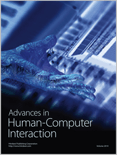
Advances in Human-Computer Interaction
Scope & Guideline
Exploring the future of interaction.
Introduction
Aims and Scopes
- User Experience and Usability Evaluation:
The journal emphasizes the importance of user experience (UX) and usability across different systems, including educational tools, digital platforms, and interactive technologies. It explores methodologies for evaluating and enhancing user interfaces to ensure they meet the needs of diverse user groups. - Emerging Technologies in HCI:
A significant focus is placed on the application of emerging technologies, such as artificial intelligence, machine learning, and virtual reality, in improving human-computer interaction. The journal highlights how these technologies can innovate user engagement and interaction design. - Cultural and Contextual Factors in Interaction:
The journal also addresses cultural influences and contextual factors that affect human-computer interaction. This includes studies on usability in different cultural settings and the adaptation of technologies to meet varying user needs. - Health and Well-being Applications:
Research related to health and well-being, including digital mental health interventions and assistive technologies, is a core area. The journal examines how HCI can contribute to health outcomes and enhance user experience in medical applications. - Educational Technologies and Learning Systems:
The journal explores the role of HCI in educational settings, focusing on learning management systems, serious games, and other educational technologies that facilitate learning and engagement among students.
Trending and Emerging
- Artificial Intelligence in HCI:
Recent publications highlight a growing interest in the application of artificial intelligence within human-computer interaction, particularly in areas like digital banking, speech recognition, and user experience enhancements. - Digital Mental Health Solutions:
There is an increasing focus on digital mental health interventions, emphasizing the importance of user-centered design in creating effective applications for mental health support. - Integration of Mixed-Reality Technologies:
The use of mixed-reality technologies in educational and training contexts is emerging as a significant theme, showcasing innovative approaches to enhance learning experiences and practical skills development. - Systematic Reviews and Meta-Analyses:
A trend towards systematic reviews and meta-analyses reflects a maturation of the field, allowing for comprehensive evaluations of existing research and guiding future studies in HCI. - Accessibility in Technology:
Research on accessibility, particularly for users with disabilities, is gaining prominence. This includes studies on serious games and applications designed specifically for low-vision children, highlighting a commitment to inclusivity.
Declining or Waning
- Traditional User Interface Design:
There seems to be a waning interest in traditional user interface design methods, as the field shifts towards more innovative and adaptive technologies that cater to user needs in real-time rather than static designs. - Generalized Studies on Usability:
General studies on usability without specific contextual applications are becoming less frequent, indicating a trend toward more focused research that addresses specific user groups or technologies. - Basic Machine Learning Applications:
Basic applications of machine learning in HCI are seeing a decline as the field moves towards more sophisticated and integrated approaches that leverage advanced techniques like deep learning and AI-driven solutions.
Similar Journals

Universal Access in the Information Society
Transforming research into actionable insights for all.Universal Access in the Information Society is a distinguished academic journal published by SPRINGER HEIDELBERG, focusing on the critical fields of computer networks, human-computer interaction, information systems, and software. Established in 2003, this periodical aims to disseminate innovative research that tackles the challenges of universal access to information and communication technologies, making it a vital resource for researchers, professionals, and students dedicated to enhancing digital inclusivity. With a commendable impact reflected in its Scopus rankings, it places in the second quartile for Computer Networks and Communications and Information Systems, as well as in the third quartile for Human-Computer Interaction, verifying its pivotal role in advancing knowledge within these domains. Although currently not open access, the journal offers comprehensive insights that are essential for anyone looking to contribute to or comprehend the evolving landscape of information societal access. The journal's commitment to bridging knowledge gaps makes it indispensable for both academic and practical applications in the Information Society.

CCF Transactions on Pervasive Computing and Interaction
Transforming Ideas into Pervasive SolutionsCCF Transactions on Pervasive Computing and Interaction, published by SPRINGERNATURE, is a leading academic journal dedicated to advancing the field of pervasive computing and interaction. With an ISSN of 2524-521X and E-ISSN 2524-5228, this journal is well-regarded for its rigorous peer-reviewed research, featuring influential studies that explore the intersection of Artificial Intelligence, Computer Networks and Communications, Computer Science Applications, and Human-Computer Interaction. Recognized in the 2023 journal rankings, it holds a prestigious Q2 quartile classification across these domains, reflecting its impact and relevance in the academic community. Researchers and practitioners can greatly benefit from its contributions, showcasing innovative approaches and technologies that shape the future of interactive computing. Although currently not following an open-access model, the journal underscores its commitment to high-quality research dissemination, making it a vital resource for those interested in the evolving landscape of pervasive technologies and user-centric designs. For more information on submissions and access options, please refer to the official website.

BEHAVIOUR & INFORMATION TECHNOLOGY
Exploring the Intersection of Mind and Machine.BEHAVIOUR & INFORMATION TECHNOLOGY, published by Taylor & Francis Ltd, is a leading journal in the interdisciplinary field that bridges the gap between technology and human behavior. Established in 1982 and continuing through 2024, this journal has garnered a high reputation with impressive rankings in 2023 across various categories: Q1 in Arts and Humanities (miscellaneous), Q2 in Developmental and Educational Psychology, Q2 in Human-Computer Interaction, and Q1 in Social Sciences (miscellaneous). The journal's robust Scopus rankings point to its influence among peers, being placed in the top percentiles across multiple relevant disciplines. Although it does not offer open access, it remains a pivotal resource for researchers and practitioners interested in the dynamics of technology's impact on behavior. By publishing rigorously peer-reviewed research, BEHAVIOUR & INFORMATION TECHNOLOGY aims to foster insights that enhance our understanding of how information technology shapes human interactions and societal outcomes, making it a crucial publication for anyone engaged in this rapidly evolving field.
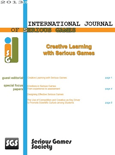
International Journal of Serious Games
Connecting Ideas and Innovations in Serious GamesThe International Journal of Serious Games is a pioneering publication dedicated to advancing the interdisciplinary field of serious games and their application in various domains such as education, artificial intelligence, and human-computer interaction. Published by SERIOUS GAMES SOC in Italy, this Open Access journal has been facilitating unrestricted access to innovative research since 2014. The journal is recognized for its quality, achieving prominent rankings in its categories, including Q2 in Education and Q2 in Computer Graphics and Computer-Aided Design as of 2023. With its commitment to academic rigor, it places itself as an essential resource for researchers, professionals, and students seeking to explore the transformative potential of serious games. Housed at the IST INT COMUNICAZIONI, VILLA PIAGGIO, GENOA, the journal continues to foster knowledge sharing and collaboration across disciplines, enriching the global discourse on gaming for impact.
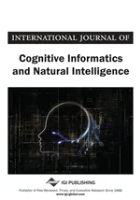
International Journal of Cognitive Informatics and Natural Intelligence
Fostering Collaborative Insights in Cognitive TechnologiesThe International Journal of Cognitive Informatics and Natural Intelligence, published by IGI Global, is an essential resource for researchers and professionals exploring the intersections of cognitive informatics, artificial intelligence, and human-computer interaction. Since its establishment in 2007, this journal has focused on advancing the understanding of cognitive systems and their applications in natural intelligence, contributing significantly to the fields of software engineering and interface design. Operating out of the United States, the journal aims to disseminate high-quality research and innovative methodologies to foster interdisciplinary collaboration. Despite its current standing in Q4 quartiles for the fields of Artificial Intelligence, Human-Computer Interaction, and Software, it serves as a vital platform for emerging scholars and seasoned professionals alike seeking to explore new frontiers in cognitive technologies. While it does not provide direct open access, these publications are instrumental in shaping academic discourse, and contribute to ongoing advancements in how we understand and integrate cognitive science into practical applications.

International Journal of Digital Multimedia Broadcasting
Connecting Ideas in the World of Media TechnologyThe International Journal of Digital Multimedia Broadcasting is a leading scholarly platform dedicated to the interdisciplinary exploration of digital multimedia broadcasting, published by HINDAWI LTD. With an ISSN of 1687-7578 and an E-ISSN of 1687-7586, this Open Access journal has made significant strides since its inception in 2008, ensuring wide accessibility and dissemination of research. Based in the United States, at Adam House, 3rd Flr, 1 Fitzroy Sq, London W1T 5HF, England, the journal covers a range of topics relevant to Communication, Electrical and Electronic Engineering, and Media Technology, boasting impressive Scopus rankings that highlight its influence in these fields. As part of the Q3 category in Communication and Electrical Engineering, and Q2 in Media Technology for 2023, the journal serves a vital role in fostering the understanding of technological advancements and their applications in multimedia broadcasting. Researchers, professionals, and students are encouraged to contribute to and benefit from the journal's rich repository of knowledge, paving the way for innovative developments in this dynamic industry.

USER MODELING AND USER-ADAPTED INTERACTION
Pioneering Techniques for Personalized User ExperiencesUSER MODELING AND USER-ADAPTED INTERACTION, published by SPRINGER, stands as a pivotal journal within the realms of Computer Science Applications, Education, and Human-Computer Interaction. With an ISSN of 0924-1868 and an E-ISSN of 1573-1391, this journal has established a reputable presence since its inception in 1991, continuing to contribute to the scholarly discourse through 2024. With an impressive impact factor reflective of its high visibility, it is ranked in the top quartiles, notably Q1 in both Computer Science Applications and Education, and Q2 in Human-Computer Interaction as of 2023. This positions the journal within the 95th percentile in Social Sciences Education and the 81st percentile in Human-Computer Interaction. As it encompasses a broad scope that integrates user modeling techniques with adaptive interaction strategies, the journal caters to the needs of researchers, professionals, and students keen on advancing knowledge in adaptive technology, educational tools, and user-centric design. While not currently open access, it remains a valuable resource for anyone interested in the intersection of user experience and technological adaptation.
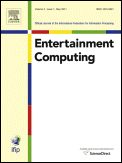
Entertainment Computing
Advancing Research at the Heart of Entertainment TechnologyEntertainment Computing, published by ELSEVIER SCI LTD, is a leading journal that explores the intersection of computing technology and entertainment, encompassing a wide range of topics from video games to interactive media. With an ISSN of 1875-9521 and an E-ISSN of 1875-953X, this esteemed publication caters to an interdisciplinary audience, including researchers, industry professionals, and students. Since its inception in 2009, the journal has achieved impressive recognition in the academic community, ranking in the Q2 quartile for both Computer Science Applications and Human-Computer Interaction, as well as Software, according to the 2023 category quartiles. The journal's commitment to high-quality, peer-reviewed research is reflected in its Scopus rankings, where it currently stands at Rank #142/407 in Computer Science Software and Rank #62/145 in Human-Computer Interaction. With its focus on innovative research that advances the understanding of how technology shapes our entertainment experiences, Entertainment Computing plays a pivotal role in fostering scholarly discussion and practical applications in the field.
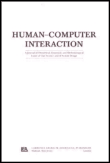
HUMAN-COMPUTER INTERACTION
Pioneering Research in Human-Computer DynamicsHUMAN-COMPUTER INTERACTION is a premier academic journal published by Taylor & Francis Inc, dedicated to the interdisciplinary field of HCI, which explores the dynamic interactions between humans and computers. With its ISSN 0737-0024 and E-ISSN 1532-7051, the journal maintains a strong presence within the academic community and is recognized for its significant impact, holding a commendable impact factor that underscores its relevance. Ranked in the Q1 category for both Applied Psychology and Human-Computer Interaction, it occupies a critical position in Scopus rankings, listed as #15 in Applied Psychology and #11 in Computer Science, Human-Computer Interaction, placing it in the top 6% of relevant fields. Covering a broad spectrum of topics from usability studies to user experience design, the journal aims to facilitate innovative research and provide insights that bridge theoretical frameworks and practical applications. Published since 1985 and continuously evolving, HUMAN-COMPUTER INTERACTION remains an essential resource for researchers, professionals, and students eager to contribute to and benefit from advances in understanding how technology can effectively serve human needs.
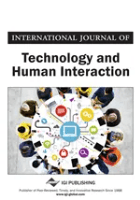
International Journal of Technology and Human Interaction
Fostering Interdisciplinary Dialogue on Technology's ImpactInternational Journal of Technology and Human Interaction, published by IGI Global, serves as a critical platform for the exploration of the intersection between technology and human behavior, offering an interdisciplinary lens on topics within the realms of Human-Computer Interaction and Information Systems. With an ISSN of 1548-3908 and an E-ISSN of 1548-3916, this journal has been contributing to scholarly discourse since its inception in 2005, with ongoing publication until 2024. Hosting a diverse range of research articles, case studies, and reviews, the journal aims to advance the understanding of how technology influences human experience and interaction patterns in various contexts. Although currently positioned in the Q4 quartile of both Human-Computer Interaction and Information Systems categories, the journal fosters knowledge that aspires to redefine scope and standards within the field. Its commitment to quality research is reflected in its Scopus rankings, showcasing its relevance despite its emerging status in academia. Targeting researchers, professionals, and students alike, the International Journal of Technology and Human Interaction invites contributions that address the pressing challenges and innovations at the nexus of technology and human interaction.